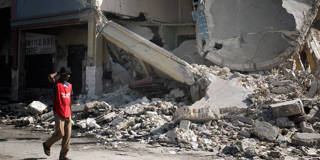When a state functions well, it can save hundreds of thousands of lives in a single event. And when it fails, as Haiti is reminding the world yet again these days, the consequences often are dire.
LONDON — On January 12, 2010, Haiti suffered an earthquake measuring 7.0 on the Richter scale. Estimates of the fatalities range from 100,000 to 316,000. Barely a month and half later, a magnitude 8.8 earthquake hit Chile, leaving 500 dead, 150 of them from the subsequent tsunami. Whereas large swaths of Haiti’s main cities were reduced to rubble, including the National Palace – the president’s official residence – in Port-au-Prince, in Chile very few multi-story buildings collapsed, killing their inhabitants.
Unlike in Haiti, Chileans benefited from stringent building codes (adopted after another massive earthquake in 1960) and a culture, nurtured over generations, of building inspectors who allowed no construction shortcuts and, crucially, took no bribes. When the state works, it can save hundreds of thousands of lives in a single event. And when it fails, as Haiti is reminding the world yet again these days, the consequences are dire.
Now, this is all so obvious that it should not need repeating, except that it runs counter to the narrative du jour. Citizens are anxious because their governments are not delivering, hums the conventional wisdom. And governments are not delivering because they have been rendered toothless by the forces of globalization. That will take a long time to fix, citizens are told. Until then, they are on their own. No wonder they feel anxious.

LONDON — On January 12, 2010, Haiti suffered an earthquake measuring 7.0 on the Richter scale. Estimates of the fatalities range from 100,000 to 316,000. Barely a month and half later, a magnitude 8.8 earthquake hit Chile, leaving 500 dead, 150 of them from the subsequent tsunami. Whereas large swaths of Haiti’s main cities were reduced to rubble, including the National Palace – the president’s official residence – in Port-au-Prince, in Chile very few multi-story buildings collapsed, killing their inhabitants.
Unlike in Haiti, Chileans benefited from stringent building codes (adopted after another massive earthquake in 1960) and a culture, nurtured over generations, of building inspectors who allowed no construction shortcuts and, crucially, took no bribes. When the state works, it can save hundreds of thousands of lives in a single event. And when it fails, as Haiti is reminding the world yet again these days, the consequences are dire.
Now, this is all so obvious that it should not need repeating, except that it runs counter to the narrative du jour. Citizens are anxious because their governments are not delivering, hums the conventional wisdom. And governments are not delivering because they have been rendered toothless by the forces of globalization. That will take a long time to fix, citizens are told. Until then, they are on their own. No wonder they feel anxious.